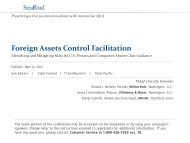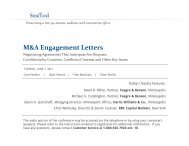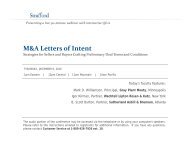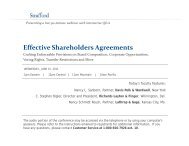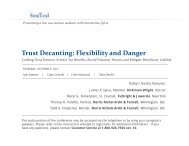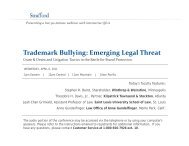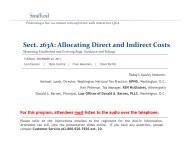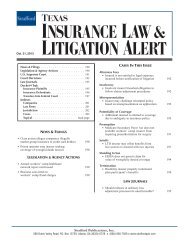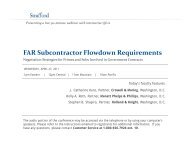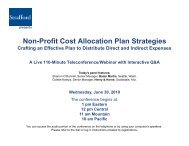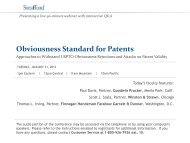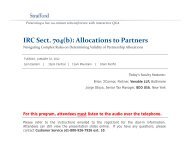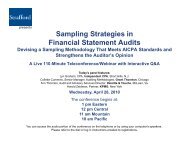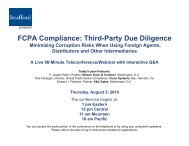Patent Indemnification Provisions - Strafford
Patent Indemnification Provisions - Strafford
Patent Indemnification Provisions - Strafford
Create successful ePaper yourself
Turn your PDF publications into a flip-book with our unique Google optimized e-Paper software.
Presenting a live 90‐minute webinar with interactive Q&A<strong>Patent</strong> <strong>Indemnification</strong> <strong>Provisions</strong>Negotiating <strong>Indemnification</strong> Clauses to Allocate <strong>Patent</strong> Infringement RiskTUESDAY, JUNE 28, 20111pm Eastern | 12pm Central | 11am Mountain | 10am PacificTd Today’s faculty features:Ira A. Schreger, Partner, Vinson & Elkins, New YorkRobert E. Krebs, Partner, Nixon Peabody, Palo Alto, Calif.Eleanor Hynes Yost, Attorney, Goodwin Procter, Washington, D.C.The audio portion of the conference may be accessed via the telephone or by using your computer'sspeakers. Please refer to the instructions emailed to registrants for additional information. If youhave any questions, please contact Customer Service at 1-800-926-7926 ext. 10.
Conference MaterialsIf you have not printed the conference materials for this program, pleasecomplete the following steps:• Click on the + sign next to “Conference Materials” in the middle of the left-hand column on your screen.• Click on the tab labeled “Handouts” that appears, and there you will see aPDF of the slides for today's program.• Double click on the PDF and a separate page will open.• Print the slides by clicking on the printer icon.
Continuing Education CreditsFOR LIVE EVENT ONLYFor CLE purposes, please let us know how many people are listening at yourlocation by completing each of the following steps:• Close the notification box• In the chat box, type (1) your company name and (2) the number ofattendees at your location• Click the blue icon beside the box to send
Tips for Optimal QualitySound QualityIf you are listening via your computer speakers, please note that the quality ofyour sound will vary depending on the speed and quality of your internetconnection.If the sound quality is not satisfactory and you are listening via your computerspeakers, you may listen via the phone: dial 1-888-450-9970 and enter your PINwhen prompted. Otherwise, please send us a chat or e-mailsound@straffordpub.com immediately so we can address the problem.If you dialed in and have any difficulties during the call, press *0 for assistance.Viewing QualityTo maximize your screen, press the F11 key on your keyboard. To exit full screen,press the F11 key again.
<strong>Patent</strong> <strong>Indemnification</strong> <strong>Provisions</strong>:Negotiating <strong>Indemnification</strong> Clauses to Allocate<strong>Patent</strong> Infringement RiskIntroductionEleanor M. Yosteyost@goodwinprocter.comGoodwin Procter, LLP©2011 Goodwin Procter LLP
<strong>Patent</strong> <strong>Indemnification</strong> <strong>Provisions</strong>• We are going to cover…› Types of transactions▪▪▪Sales ofgoods/services<strong>Patent</strong>/technologylicenseJoint R&D agreement› Definitions› Common clausesGoodwin Procter LLP 6
Types of Transactions: Sales of Goods and Services• The Uniform Commercial Code §2-312› Implied Warranty of Non-infringementi ▪ Scope• <strong>Patent</strong>s and trademarks• Copyrights• Damages› Settlements› “Rightful Claims”› Attorneys’ fees and litigation expensesGoodwin Procter LLP 7
Types of Transactions: Sales of Goods and Services• The Uniform Commercial Code §2-312› Implied Warranty of Non-infringement▪ Limitations – UCC 2-312(3)• Special order buyer• Normal course of business• Merchants• Use of goods• No duty to investigate and/or disclose▪ Subject to negotiation• Implied warranty may be contractually disclaimed• Common provisions found in purchase order forms mayprompt implied warrantyGoodwin Procter LLP 8
Types of Transactions: <strong>Patent</strong> & Technology Licenses• Implied Obligations› No implied warranty under common law principlesi › Subject to negotiation› Various scenarios▪ <strong>Patent</strong> license, no technology▪ Technology license of specifications and drawings▪ Technology and trademark licenses• TyingGoodwin Procter LLP 9
Types of Transactions: <strong>Patent</strong> & Technology Licenses• Common Law Theories of Liability› Fraud and misrepresentationti› Strict liability› Agency› Indemnity based on contribution› Indemnity based on contractGoodwin Procter LLP 10
Types of Transactions: Joint Ventures• Joint Venture Agreements› No standard d common law principlesi › Need clear unequivocal provisions to shift risk› Partnership law principles apply› Joint ventures cannot be implied› <strong>Indemnification</strong> obligations not automatically terminatedGoodwin Procter LLP 11
Definitions: Representation• A representation is a statement as to the existence of a fact, orstate of mind which acts as an inducement to contract› Examples:▪▪“The Licensor is the legal owner of the Licensed <strong>Patent</strong>.”(Existence of fact)“To the best of the Licensor’s knowledge the Licensee’s practiceof the rights is subject to no valid claims of infringement by anythird party.” (State of mind)› Key elements▪▪Point in timeDuration of reliance› True but “misleading” representationsGoodwin Procter LLP 12
Definitions: Warranty• A warranty is a contractual promise that assures the existence of afact or conduct upon which the other party may rely› E.g., “The Licensed <strong>Patent</strong> is not [representation], and duringthe Term of this Agreement shall not become [warranty], subjectto any liens … ”› Remedies▪▪Contractual damagesRescissionGoodwin Procter LLP 13
Definitions: Indemnity• An indemnity is “[a] collateralcontract or assurance, bywhich one person engages tosecure another against ananticipated loss.”› Resolution of patent validityis not required forresolution of indemnityGoodwin Procter LLP 14
Definitions: Duty to Defend• The duty to defend arises at the earliest stages of litigation andgenerally exists regardless of whether the party is ultimately foundliable› In contrast, indemnification only requires the indemnitorreimburse the indemniteeGoodwin Procter LLP 15
Common Clauses: Representations and Warranties• Representations and Warranties› General corporate warranties› Intellectual property representations and warrantiesGoodwin Procter LLP 16
Common Clauses: Limitations of Liability• Claims› Indirect infringementi › Personal injury, death or property damage• Specific events• Wrongful actsGoodwin Procter LLP 17
Common Clauses: Limitations of Damages• Consequential› Costs and expenses incurred to procure the services from analternate source as a result of vendor’s breach› Expenses incurred due to breach› Payments or penalties• Third party• Lost profitsGoodwin Procter LLP 18
Common Clauses: Indemnity <strong>Provisions</strong>• Questions to Ask…› Type of agreement?› Who has control over the design?› Which parties are covered?› What the parties know?› Cooperation and duty to defend› Choice of law› Mandatory yprovisionsGoodwin Procter LLP 19
Negotiating g and Drafting <strong>Patent</strong><strong>Indemnification</strong> <strong>Provisions</strong>June 28, 2011Ira SchregerVinson & Elkins LLP
Agenda• General Considerations• Implied Warranty for Sales of Goods and Services• General Drafting Considerations• Considerations Unique to <strong>Patent</strong> Law21
General Considerations
Purpose of an <strong>Indemnification</strong> Clause• The purpose of an indemnification ifi clause is to allocaterisk between the indemnifying party (the indemnitor)and the indemnified party (the indemnitee).• The first and most important step is to determine whatyour client desires to achieve under an indemnificationclause. This will be your starting point for both draftingand negotiating.g23
A Word of Caution…<strong>Indemnification</strong> clauses are frequentlynegotiated at the end of the draftingprocess. This is the point where manypeople do not want to be bothered to spendthe time negotiating what is perceived to bea “boiler-plate” provision. However, due tothe far-reaching impact of indemnificationifi clauses it is important to spend timethinking about how to best protect yourclient (whether the indemnitee it orindemnitor). <strong>Indemnification</strong> clausesshould not be rushed.24
Defend, Indemnify and Hold HarmlessThe indemnitor hereby agreesto defend, indemnify and holdharmless the indemniteeagainst any claims of patentinfringement brought by thirdparties.25
What do these terms mean?• Defend – the indemnitor it has to defend d the indemniteeitagainst any claims covered by the indemnificationclause. But how does the indemnitor do this?• Indemnify – to reimburse (another) for a loss sufferedbecause of a third party’s or one’s own act or default. 1• Hold harmless – to absolve (another party) fromresponsibility for damage or other liability arising fromthe transaction. 1• Black’s Law Dictionary states that indemnify and holdharmless are synonyms. Using both of these termsmay create ambiguity it where none needs to exist.1Black’s Law Dictionary26
A Sample <strong>Indemnification</strong> ProvisionScope. The Licensor (the “Indemnitor”) hereby indemnifies the Licensee and its directors, officers, employees,and agents and their respective successors, heirs and assigns (the “Indemnitee”) against any and all damagesarising out of, resulting from or related to any claim of patent infringement brought by a Third Party accusing anyproduct manufactured by Licensee pursuant to this Agreement of infringing a U.S. patent (a “Third Party Claim”),subject to the limitations set forth below.Notice. If the Indemnitee seeks indemnification, it shall give written notice to the Indemnitor promptly after theIndemnitee becomes aware of the facts giving g rise to such claim for indemnification (an “Indemnified Claim”), andin any event within 30 days, specifying in reasonable detail the factual basis of the Indemnified Claim and statingthe amount of the damages (or if not known, a good faith estimate of the amount of damages).Control. In the event of receipt of notice of a Third Party Claim, the Indemnitor shall have the right to control anddefend such Third Party Claim, in such manner as it may deem appropriate. Should the Indemnitor decline tocontrol and defend the Third Party Claim, the Indemnitee shall have the right to control and defend the Third PartyClaim in such manner as it may deem appropriate. The controlling party shall select counsel, contractors, expertsand consultants of recognized standing and competence reasonably acceptable to the other party, shall takereasonable steps necessary in the investigation, defense or settlement thereof, and shall diligently and promptlypursue the resolution thereof. All parties shall cooperate fully with the party conducting the defense of any ThirdParty Claim.Settlement. The party controlling the defense of any Third Party Claim shall be authorized to consent to asettlement of, or the entry of any judgment arising from, any Third Party Claims subject to the following provisions.If the Indemnitor is controlling the litigation, Indemnitee must consent to any such settlement, such consent not tobe unreasonably withheld. Indemnitee’s consent will be deemed unreasonably withheld unless the settlementwould encumber any of its assets or contains any restriction or condition that would apply to the Indemnitee or tothe conduct of its business. If the Indemnitee is controlling the litigation, it may not enter into a settlement orconsent to an entry of judgment with respect to any Third Party Claim without the express written consent of theIndemnitor, not to be unreasonably withheld.Limitations. The Indemnitor’s minimum liability to Indemnitee hereunder shall be $750,000. The Indemnitor’smaximum liability to Indemnitee hereunder shall be $10,000,000. In no case shall Indemnitor be liable for anyconsequential, incidental, indirect, special, punitive or exemplary damages (including, without limitation, lost profits,business or goodwill) suffered or incurred by Indemnitee. In no case shall Indemnitor be liable for any damagesarising i out of Indemnitee’s negligent or reckless conduct.Reimbursement. Indemnitee shall responsible for paying any damages arising out of a Third Party Claim to theThird Party. Indemnitor shall reimburse Indemnitee within thirty (30) days of Indemnitee making such a payment.The amount of the reimbursement shall be reduced by any amount Indemnitee receives or will receive from (a) aninsurance carrier or (b) a joint infringer. 27
Implied Warranty a for Sales of Goods andServices
Sale of Goods Under UCC §2-312Unless otherwise agreed, a seller that t is a merchantregularly dealing in goods of the kind warrants that thegoods shall be delivered free of the rightful claim of anythird person by way of infringement or the like but abuyer that furnishes specifications to the seller must holdthe seller harmless against any such claim that arises outof compliance with the specifications.29
Sale of Goods Under UCC §2-312• The seller must be a merchant regularly dealing inthe goods.• The indemnity is limited to the goods themselves asdelivered—itit does not cover the buyer’s use of thegoods.• The implied warranty only covers “rightful” claims,which has been defined by courts to be more thanfrivolous or of a substantial nature.• The implied warranty does not apply if the buyergives the specifications for the product to the seller.Any patent infringement that arises here will triggerbuyer’s good faith duty to indemnify the seller forlosses suffered.30
And Remember…Two parties can always agree to not be covered by theimplied warranty provided in UCC § 2-312.31
General Drafting Considerations
Drafting an <strong>Indemnification</strong> ClauseDrafting an indemnification ifi clause is necessary when:• The parties involved in a sale of goods do not wish tobe bound by the implied warranty provided in UCC §2-312.• The parties are involved in a transaction not coveredby UCC 2-312, including:– A licensing agreement– A joint research and development agreement33
<strong>Indemnification</strong> ProvisionScope. The Licensor (the “Indemnitor”) hereby indemnifies the Licensee and its directors, officers, employees,and agents and their respective successors, heirs and assigns (the “Indemnitee”) against any and all damagesarising out of, resulting from or related to any claim of patent infringement brought by a Third Party accusing anyproduct manufactured by Licensee pursuant to this Agreement of infringing a U.S. patent (a “Third Party Claim”),subject to the limitations set forth below.Notice. If the Indemnitee Scope. seeks The indemnification, Licensor it shall (the give “Indemnitor”) written notice the Indemnitor hereby promptly after theIndemnitee becomes indemnifies aware of the facts the giving Licensee rise to such claim and for its indemnification directors, (an “Indemnified officers, Claim”) ), in any event within 30 days, specifying in reasonable detail the factual basis of the Indemnified Claim and statingandthe amount of the employees, damages (or if not and known, agents a good faith and estimate their of amount respective of damages).Control. In the event of receipt of notice of a Third Party Claim, the Indemnitor shall have the right to control anddefend such Thirdsuccessors,Party Claim, in suchheirsmannerandas it mayassignsdeem appropriate.(the “Indemnitee”)Should the Indemnitor decline tocontrol and defend against the Third Party any Claim, and the all Indemnitee damages shall have arising the right to out control of, and resultingdefend the Third PartyClaim in such manner as it may deem appropriate. The controlling party shall select counsel, contractors, expertsand consultants from of recognized or related standing and to competence any claim reasonably of patent acceptable infringementto the other party, shall takereasonable steps necessary in the investigation, defense or settlement thereof, and shall diligently and promptlypursue the resolution brought thereof. by All parties a Third shall cooperate Party fully accusing with the party any conducting product the defense of any ThirdParty Claim. manufactured by Licensee pursuant to thisSettlement. settlement of, The or Agreement the party entry controlling of any judgment the of defense infringing arising i of any from, i Third any a Party U.S. Third Claim Party patent shall Claims be t subject authorized (a “Third to the to following consent Partyto provisions.aIf the Indemnitor is controlling the litigation, Indemnitee must consent to any such settlement, such consent not tobe unreasonablyClaim”)withheld. Indemnitee’ssubjectconsentto thewill belimitationsdeemed unreasonablyset forthwithheldbelow.unless the settlementwould encumber any of its assets or contains any restriction or condition that would apply to the Indemnitee or tothe conduct of its business. If the Indemnitee is controlling the litigation, it may not enter into a settlement orconsent to an entry of judgment with respect to any Third Party Claim without t the express written consent of theIndemnitor, not to be unreasonably withheld.Limitations. The Indemnitor’s minimum liability to Indemnitee hereunder shall be $750,000. The Indemnitor’smaximum liability to Indemnitee hereunder shall be $10,000,000. In no case shall Indemnitor be liable for anyconsequential, incidental, indirect, special, punitive or exemplary damages (including, without limitation, lost profits,business or goodwill) suffered or incurred by Indemnitee. In no case shall Indemnitor be liable for any damagesarising out of Indemnitee’s negligent or reckless conduct.Reimbursement. Indemnitee shall responsible for paying any damages arising out of a Third Party Claim to theThird Party. Indemnitor shall reimburse Indemnitee within thirty (30) days of Indemnitee making such a payment.The amount of the reimbursement shall be reduced by any amount Indemnitee receives or will receive from 34 (a) aninsurance carrier or (b) a joint infringer.
What Types of Claims will be Covered?IndemnitorIndemnitee• Goal – to have as few claimscovered as possible.• Goal – cover as many claimsas possible.• Strategies:• Strategies:– Limit to claims brought byspecific third parties.– Do not accept limitations onthe subject matter of the– Limit the time that theclaims or who can bringindemnification provision willthem.apply.– Try to obtain indemnification– Limit the indemnification tofor a claim that results from athe product itself, and not tomisrepresentation or breachuse of the product.of a warranty.35
Who Will be Covered?• Strategiest – Indemnitor – include fewer people and entities– Indemnitee – include as many people and entities as possible• Generally the indemnification should include theindemnitee’s directors, officers, employees, andagents.• Consider whether the indemnification should includeIndemnitee’s subsidiaries.• If the transaction allows for sublicensing, will theindemnitee’s sublicensee be indemnified?• Will the indemnitee’s successors, heirs and assigns becovered?• Will indemnitee’s customers be covered?36
<strong>Indemnification</strong> ProvisionScope. The Licensor (the “Indemnitor”) hereby indemnifies the Licensee and its directors, officers, employees,and agents and their respective successors, heirs and assigns (the “Indemnitee”) against any and all damagesarising out of, resulting from or related to any claim of patent infringement brought by a Third Party accusing anyproduct manufactured by Licensee pursuant to this Agreement of infringing a U.S. patent (a “Third Party Claim”),subject to the limitations set forth below.Notice. If the Indemnitee seeks indemnification, itNotice. If the Indemnitee seeks indemnification, it shall give written notice the Indemnitor after theIndemnitee becomes shall aware give of the written facts giving notice rise to such to claim the for Indemnitor indemnification (an promptly“Indemnified Claim”) ), in any event within 30 days, specifying in reasonable detail the factual basis of the Indemnified Claim and statingandthe amount of the after damages the (or Indemnitee if not known, a good becomes faith estimate of aware the amount of damages). the factsControl. In the giving event of receipt rise of to notice such of a Third claim Party Claim, for indemnification the Indemnitor shall have the (an right to control anddefend such Third Party Claim, in such manner as it may deem appropriate. Should the Indemnitor decline tocontrol and defend “Indemnified the Third Party Claim, Claim”), the Indemnitee and shall in have any the event right to control within and defend 30 the Third PartyClaim in such manner as it may deem appropriate. The controlling party shall select counsel, contractors, expertsand consultants days, of recognized specifying standing and competence in reasonable reasonably detail acceptable the to the factual other party, shall takereasonable stepsbasisnecessaryofinthe investigation,Indemnifieddefense orClaimsettlementandthereof,statingand shallthediligently and promptlypursue the resolution thereof. All parties shall cooperate fully with the party conducting the defense of any ThirdParty Claim. amount of the damages (or if not known, a goodSettlement. The party controlling the defense of any Third Party Claim shall be authorized to consent to afaith estimate of the amount of damages).settlement of, or the entry of any judgment arising from, any Third Party Claims subject to the following provisions.If the Indemnitor is controlling the litigation, Indemnitee must consent to any such settlement, such consent not tobe unreasonably withheld. Indemnitee’s consent will be deemed unreasonably withheld unless the settlementwould encumber any of its assets or contains any restriction or condition that would apply to the Indemnitee or tothe conduct of its business. If the Indemnitee is controlling the litigation, it may not enter into a settlement orconsent to an entry of judgment with respect to any Third Party Claim without t the express written consent of theIndemnitor, not to be unreasonably withheld.Limitations. The Indemnitor’s minimum liability to Indemnitee hereunder shall be $750,000. The Indemnitor’smaximum liability to Indemnitee hereunder shall be $10,000,000. In no case shall Indemnitor be liable for anyconsequential, incidental, indirect, special, punitive or exemplary damages (including, without limitation, lost profits,business or goodwill) suffered or incurred by Indemnitee. In no case shall Indemnitor be liable for any damagesarising out of Indemnitee’s negligent or reckless conduct.Reimbursement. Indemnitee shall responsible for paying any damages arising out of a Third Party Claim to theThird Party. Indemnitor shall reimburse Indemnitee within thirty (30) days of Indemnitee making such a payment.The amount of the reimbursement shall be reduced by any amount Indemnitee receives or will receive from 37 (a) aninsurance carrier or (b) a joint infringer.
NoticeIndemnitor• The indemnitee should berequired to notify the indemnitorpromptly (but in any event withina specified time period).• The notice must in writing.• The notice should include astatement of damages sought ora good faith estimate.• The indemnitor should beinformed of possible claims.• Failure to comply with thenotification provision will renderthe indemnification provisioninvalid.Indemnitee• There should not be a time limiton informing the indemnitor ofclaims.• Breach of the notificationprovision should not have anyconsequences unless indemnitorcan show it was harmed by thefailure to notify.• The indemnitee need not informthe indemnitor of threatenedsuits, only of filed suits.38
<strong>Indemnification</strong> ProvisionScope. Effective as of the Closing, the Licensor (the “Indemnitor”) hereby indemnifies the Licensee and itsdirectors, officers, employees, and agents and their respective successors, heirs and assigns (the “Indemnitee”)against any and all damages arising out of, resulting from or related to any claim of patent infringement brought bya Third Party accusing Control. any product In manufactured the event by Investor of receipt pursuant of to this notice Agreement of of a infringing Third a U.S.patent (a “Third Claim”).Party Claim, the Indemnitor shall have the right toNotice. If the Indemnitee seeks indemnification, it shall give written notice to the Indemnitor promptly after theIndemnitee becomes control aware and of the facts defend giving rise such to Third claim for indemnification Party Claim, (an “Indemnified in such Claim”) ), andin any event within 30 days, specifying in reasonable detail the factual basis of the Indemnified Claim and statingthe amount of the manner Damages (or as if not it known, may a deem good faith appropriate. estimate of the amount Should of Damages). theControl. In the Indemnitor event of receipt of notice decline of a Third to Party control Claim, the and Indemnitor defend shall have the the Third right to control anddefend such Third in such manner as may deem appropriate. Should Indemnitor decline tocontrol and defend Party the Third Claim, Party Claim, the the Indemnitee shall have shall the right have to control the and right defend to the Third PartyClaim in such manner as it may deem appropriate. The controlling party shall select counsel, contractors, expertsand consultants control of recognized and standing defend and competence the Third reasonably Party acceptable Claim to the in other such party, shall takereasonable steps manner necessary in as the investigation, it may deem defense appropriate. or settlement thereof, and The shall controllingdiligently and promptlypursue the resolution thereof. All parties shall cooperate fully with the party conducting the defense of any ThirdParty Claim. party shall select counsel, contractors, experts andSettlement. settlement of, The or consultantsthe party entry controlling of any judgment the of defense recognized arising of any from, Third any Party Third standing Claim Party shall Claims and be subject authorized competence,to the to following consent to provisions.aIf the Indemnitor shall is controlling take the reasonable litigation, Indemnitee steps must consent necessary to any such settlement, in the such consent not tobe unreasonably withheld. Indemnitee’s consent will be deemed unreasonably withheld unless the settlementwould encumber investigation, any of its assets or contains defense any restriction or settlement or condition that would thereof, apply to and the Indemnitee or tothe conduct of its business. If the Indemnitee is controlling the litigation, it may not enter into a settlement orconsent to an entry shall of judgment diligently with respect and to any promptly Third Party Claim pursue without t the express resolution written consent of theIndemnitor, not thereof. to be unreasonably All withheld. parties shall cooperate fully with theLimitations. The Indemnitor’s minimum liability to Indemnitee hereunder shall be $750,000. The Indemnitor’smaximum liability party to Indemnitee conducting hereunder shall the be $10,000,000. defense In of no any case shall Third Indemnitor Party be liable for anyconsequential, incidental, indirect, special, punitive or exemplary damages (including, without limitation, lost profits,business or goodwill)Claim.suffered or incurred by Indemnitee. In no case shall Indemnitor be liable for any damagesarising out of Indemnitee’s negligent or reckless conduct.Reimbursement. Indemnitee shall responsible for paying any damages arising out of a Third Party Claim to theThird Party. Indemnitor shall reimburse Indemnitee within thirty (30) days of Indemnitee making such a payment.The amount of the reimbursement shall be reduced by any amount Indemnitee receives or will receive from 39 (a) aninsurance carrier or (b) a joint infringer.
Who Will Control the Defense?IndemnitorIndemnitee• Since the indemnitor willultimately have to pay thedamages, the indemnitor it has• While the indemnitee maylike to control the litigation, itsinterest t probably bl isn’t asa strong interest in controlling strong as the indemnitor.•the litigation.The indemnitor it should also• The indemnitee will likelyhave control of the relevantensure that the indemnitee isrequired to cooperate with thedefense efforts.documents and witness, andshould be prepared tocooperate with theindemnitor.40
<strong>Indemnification</strong> ProvisionScope. The Licensor (the “Indemnitor”) hereby indemnifies the Licensee and its directors, officers, employees,and agents and their respective successors, heirs and assigns (the “Indemnitee”) against any and all damagesarising out of, resulting from or related to any claim of patent infringement brought by a Third Party accusing anyproduct manufactured Settlement. by Licensee pursuant The to party this Agreement controlling of infringing the a U.S. defense patent (a “Third of Party any Claim”),subject to the limitations set forth below.Notice. If the Indemnitee Third Party seeks indemnification, Claim shall it be give written authorized notice to the to Indemnitor consent promptly to after a theIndemnitee becomes aware of the facts giving rise to such claim for indemnification (an “Indemnified Claim”) ), in any event withinsettlement30 days, specifyingof,inorreasonablethe entrydetail theoffactualanybasisjudgmentof the IndemnifiedarisingClaim and statingandthe amount of the from, damages any (or if Third not known, Party a good faith Claims estimate subject of the amount to of damages). the followingControl. In the event of receipt of notice of a Third Party Claim, the Indemnitor shall have right to control anddefend such Third provisions. Party Claim, in such If manner the Indemnitor as may deem appropriate. is controlling Should the the Indemnitor litigation, decline tocontrol and defend Indemnitee the Third Party Claim, must the consent Indemnitee shall to have any the such right to control settlement, and defend the such Third PartyClaim in such manner as it may deem appropriate. The controlling party shall select counsel, contractors, expertsand consultants consent of recognized not standing to and be competence unreasonably acceptable withheld. to the other party, shall takereasonable steps necessary in the investigation, defense or settlement thereof, and shall diligently and promptlypursue the resolution Indemnitee’s thereof. All parties consent shall cooperate will fully be with deemed the party conducting unreasonablythe defense of any ThirdParty Claim.withheld unless the settlement would encumber any ofSettlement. The party controlling the defense of any Third Party Claim shall be authorized to consent to asettlement of, or its the assets entry of any or judgment contains arising from, any Third restriction Party Claims or subject condition to the following that provisions.If the Indemnitor is controlling the litigation, Indemnitee must consent to any such settlement, such consent not tobe unreasonably would withheld. apply Indemnitee’s to consent the Indemnitee will be deemed unreasonably or to the withheld conduct unless the of settlement itswould encumber business. any of its assets or If contains the Indemnitee any restriction or condition is controlling that would apply the to the litigation,Indemnitee or toconsentthe conduct of its business. If the Indemnitee is controlling the litigation, it may not enter into a settlement orto an entry it may of judgment not with enter respect into any a Third settlement Party Claim without or t consent the express written to an consent of theIndemnitor, not to be unreasonably withheld.Limitations. The entry Indemnitor’s of judgment minimum liability with to Indemnitee respect hereunder to any shall be Third $750,000. Party The Indemnitor’s Claimmaximum liability without to Indemnitee the hereunder express shall be written $10,000,000. consent In no case shall of the Indemnitor Indemnitor,be liable for anyconsequential, incidental, indirect, special, punitive or exemplary damages (including, without limitation, lost profits,not to be unreasonably withheld.business or goodwill) suffered or incurred by Indemnitee. In no case shall Indemnitor be liable for any damagesarising out of Indemnitee’s negligent or reckless conduct.Reimbursement. Indemnitee shall responsible for paying any damages arising out of a Third Party Claim to theThird Party. Indemnitor shall reimburse Indemnitee within thirty (30) days of Indemnitee making such a payment.The amount of the reimbursement shall be reduced by any amount Indemnitee receives or will receive from 41 (a) aninsurance carrier or (b) a joint infringer.
Settlement• Generally, the controlling party will have settlementtauthority, subject to the other’s party consent.• The indemnitee should only be able to withholdconsent if it will affect any of indemnitee’s rights.• The indemnitor should have broader discretion toreject a settlement because it will ultimately have toreimburse indemnitee for any damages.• By way of example, indemnitee should have the rightto consent to settlement if such settlement wouldprevent indemnitee from practicing a patent licensedunder the agreement.42
<strong>Indemnification</strong> ProvisionScope. The Licensor (the “Indemnitor”) hereby indemnifies the Licensee and its directors, officers, employees,and agents and their respective successors, heirs and assigns (the “Indemnitee”) against any and all damagesarising out of, resulting from or related to any claim of patent infringement brought by a Third Party accusing anyproduct manufactured Limitations. by Licensee pursuant The to Indemnitor’s this Agreement of infringing minimum a U.S. patent liability (a “Third Party to Claim”),subject to the limitations set forth below.Notice. If the Indemnitee Indemnitee seeks indemnification, hereunder it shall shall give written be notice $750,000. to the Indemnitor The promptly after theIndemnitee “Indemnified Claim”) in any event becomes within Indemnitor’s 30 aware days, of specifying the facts maximum in giving reasonable rise to detail such liability claim the factual for indemnification to basis Indemniteeof the Indemnified (an Claim and stating), andthe amount of the damages (or if not known, a good faith estimate of the amount of damages).Control. In the hereunder event of receipt of shall notice of be a Third $10,000,000. Party Claim, the Indemnitor In no shall case have the shall right to control anddefend such Third Party Claim, in such manner as it may deem appropriate. Should the Indemnitor decline tocontrol and defend Indemnitor the Third Party Claim, be liable the Indemnitee for any shall have consequential,the right to control and defend the Third PartyClaim in such manner as it may deem appropriate. The controlling party shall select counsel, contractors, expertsand consultants incidental, of recognized standing indirect, and competence special, reasonably punitive acceptable or to exemplarythe other party, shall takereasonable steps necessary in the investigation, defense or settlement thereof, and shall diligently and promptlypursue the resolution damages thereof. All (including, parties shall cooperate without fully with limitation, the party conducting lost the profits, defense any ThirdParty Claim.Settlement. The business party controlling or the goodwill) defense of any suffered Third Party Claim or shall incurred be authorized byto consent to asettlement of, or the entry of any judgment arising from, any Third Party Claims subject to the following provisions.If the Indemnitor Indemnitee. is controlling the litigation, In no Indemnitee case must shall consent Indemnitor any such settlement, be liable such consent not tobe unreasonably withheld. Indemnitee’s consent will be deemed unreasonably withheld unless the settlementwould encumber for any any of its assets damages or contains arising any restriction out or condition of Indemnitee’sthat would apply to the Indemnitee or tothe conduct of its business. If the Indemnitee is controlling the litigation, it may not enter into a settlement ornegligent or reckless conduct.consent to an entry of judgment with respect to any Third Party Claim without t the express written consent of theIndemnitor, not to be unreasonably withheld.Limitations. The Indemnitor’s minimum liability to Indemnitee hereunder shall be $750,000. The Indemnitor’smaximum liability to Indemnitee hereunder shall be $10,000,000. In no case shall Indemnitor be liable for anyconsequential, incidental, indirect, special, punitive or exemplary damages (including, without limitation, lost profits,business or goodwill) suffered or incurred by Indemnitee. In no case shall Indemnitor be liable for any damagesarising out of Indemnitee’s negligent or reckless conduct.Reimbursement. Indemnitee shall responsible for paying any damages arising out of a Third Party Claim to theThird Party. Indemnitor shall reimburse Indemnitee within thirty (30) days of Indemnitee making such a payment.The amount of the reimbursement shall be reduced by any amount Indemnitee receives or will receive from 43 (a) aninsurance carrier or (b) a joint infringer.
Floors and Caps• Floors are also known as “nickel dime provisions.”i • Floors and caps can be useful to the indemnitor.– Floors can be used to ensure that the indemnitee cannot seekindemnification for or small claims.– Caps allow the indemnitor to know its maximum exposure (ina license transaction, caps are often tied to royalties).• The indemnitee does not benefit from floors andcaps.44
LimitationsIndemnitor• Specifically exclude all claimsarising out of indemnitee’sacts or omissions, includingwillful patent infringement.• The reimbursement shouldbe reduced by:– Insurance proceeds paid toindemnitee– Third party payments toindemnitee (such as from ajoint infringer)– Tax benefits enjoyed byindemnitee due to thedamage awardIndemnitee• All claims should be covered,regardless of how they accrue (ifthere is a carve-out forindemnitee’s acts or omissions,then limit to negligence andrecklessness).• Specifically include claimsrelated to willful patentinfringement.• If there is a reimbursement, itshould only be reduced by:– Insurance proceeds paid toindemnitee– Third party payments toindemnitee (such as from a jointinfringer)45
<strong>Indemnification</strong> ProvisionScope. The Licensor (the “Indemnitor”) hereby indemnifies the Licensee and its directors, officers, employees,and agents and their respective successors, heirs and assigns (the “Indemnitee”) against any and all damagesarising out of, resulting from or related to any claim of patent infringement brought by a Third Party accusing anyproduct manufactured by Licensee pursuant to this Agreement of infringing a U.S. patent (a “Third Party Claim”),subject to the limitations set forth below.Notice. If the Indemnitee seeks indemnification, it shall give written notice to the Indemnitor promptly after theIndemnitee becomes Reimbursement. aware of the facts giving rise Indemnitee to such claim for indemnification shall responsible (an “Indemnified for Claim”) ), in any event within 30 days, specifying in reasonable detail the factual basis of the Indemnified Claim and statingandthe amount of the paying damages any (or if not damages known, a good faith arising estimate out of the of amount a Third of damages). PartyControl. In the event of receipt of notice of a Third Claim, the have the right to control anddefend such ThirdClaimParty Claim,to thein suchThirdmannerParty.as it may deemIndemnitorappropriate. ShouldshallthereimburseIndemnitor decline tocontrol and defend Indemnitee the Third Party Claim, within the Indemnitee thirty (30) shall have days the right of to Indemniteecontrol and defend the Third PartyClaim in such manner as it may deem appropriate. The controlling party shall select counsel, contractors, expertsand consultants making of recognized such standing a and payment. competence reasonably The amount acceptable to of the other party, shall takereasonable steps necessary in the investigation, defense or settlement thereof, and shall diligently and promptlypursue the resolution reimbursement thereof. All parties shall shall cooperate be reduced fully with the party by conducting any amount the defense of any ThirdParty Claim. Indemnitee receives or will receive from (a) anSettlement. The party controlling the defense of any Third Party Claim shall be authorized to consent to ainsurance carrier or (b) a joint infringer.isettlement of, or the entry of any judgment arising from, any Third Party Claims subject to the following provisions.If the Indemnitor is controlling the litigation, Indemnitee must consent to any such settlement, such consent not tobe unreasonably withheld. Indemnitee’s consent will be deemed unreasonably withheld unless the settlementwould encumber any of its assets or contains any restriction or condition that would apply to the Indemnitee or tothe conduct of its business. If the Indemnitee is controlling the litigation, it may not enter into a settlement orconsent to an entry of judgment with respect to any Third Party Claim without t the express written consent of theIndemnitor, not to be unreasonably withheld.Limitations. The Indemnitor’s minimum liability to Indemnitee hereunder shall be $750,000. The Indemnitor’smaximum liability to Indemnitee hereunder shall be $10,000,000. In no case shall Indemnitor be liable for anyconsequential, incidental, indirect, special, punitive or exemplary damages (including, without limitation, lost profits,business or goodwill) suffered or incurred by Indemnitee. In no case shall Indemnitor be liable for any damagesarising out of Indemnitee’s negligent or reckless conduct.Reimbursement. Indemnitee shall responsible for paying any damages arising out of a Third Party Claim to theThird Party. Indemnitor shall reimburse Indemnitee within thirty (30) days of Indemnitee making such a payment.The amount of the reimbursement shall be reduced by any amount Indemnitee receives or will receive from 46 (a) aninsurance carrier or (b) a joint infringer.
ReimbursementIndemnitorIndemnitee• The indemnitor should reimbursethe indemnitee within a• The indemnitor should pay thethird party directly.reasonable amount of time after• In the case of reimbursement,indemnitee has paid damages to indemnitor should be required tothe third party.reimburse indemnitee within a• The reimbursement shouldexclude the limitations discussedpreviously, including monies paidto indemnitee by insurance or byjoint defendants.• Should be limited to monies paidto the third party and expresslyexclude consequential orincidental damages.specified maximum period afterindemnitee pays the third party.• Indemnitor should also berequired to reimburse indemniteefor any consequential orincidental damages it suffers asa result of the suit.47
Considerations Unique to <strong>Patent</strong> t Law
Indemnifying Willful <strong>Patent</strong> Infringement• Enhanced damages for willful l patent t infringement i areconsidered to be punitive damages.• Some states have codified or common law publicpolicy against indemnifying a party against punitivedamages.• The UCC, however, does allow for indemnification ofpunitive damages (see UCC § 2-715).49
Joint Liability• Under patent t law, a party cannot ask for contributiontifrom jointly and severally liable parties, soindemnification clauses need not take that intoaccount.• In a joint infringement situation, the court willapportion damages between the joint infringers. Insuch a case, the amount of damages should belimited to the damages actually incurred by theindemnitee.50
Unconsidered Uses of Products• It is possible that t some uses of a product will infringeia third party patent while other uses will not.• An indemnitor can protect itself from unconsidereduses by limiting the indemnification to certain uses ofthe product.51
QuestionsIra A. SchregerVinson & Elkins LLP212-237-0208ischreger@velaw.com
Robert E. Krebs<strong>Patent</strong> Infringement<strong>Indemnification</strong>iRobert E. KrebsPartner(650) 320-7743rkrebs@nixonpeabody.com
Introduction• Uniform Commercial Code (UCC) warranty of noninfringement.› Protects both buyers and sellers.› Implied and can be disclaimed by general contractuallanguage?• Contractual <strong>Provisions</strong> affecting equipment vendors.54
UCC Philosophy Generally• When the goods are part of the seller's normal stock and aresold ldin his normal course of fbusiness, iti is his duty to see that tnoclaim of infringement of a patent or trademark by a third partywill mar the buyer's title. A sale by a person other than a dealer,however, raises no implication in its circumstances of such awarranty. Nor is there such an implication when the buyerorders goods to be assembled, prepared or manufactured on hisown specifications. If, in such a case, the resulting productinfringes a patent or trademark, the liability will run from buyer toseller. There is, under such circumstances, a tacitrepresentation on the part of the buyer that the seller will be safein manufacturing according to the specifications, and the buyeris under an obligation in good faith to indemnify him for any losssuffered.55
UCC Philosophy Generally• If the claim is one for infringement or the like (subdivision(3) of Section 2312) the original seller may demand inwriting that the buyer turn over to the seller control of thelitigation, including settlement, or else be barred from anyremedy over and if the seller also agrees to bear allexpense and to satisfy any adverse judgment, then unlessthe buyer after seasonable receipt of the demand doesturn over control the buyer is so barred.56
UCC Varies by State› California: Unless otherwise agreed a seller who is amerchant regularly dealing in goods of the kind warrants thatthe goods shall be delivered free of the rightful claim of anythird person by way of infringement or the like but a buyerwho furnishes specifications to the seller must hold the sellerharmless against any such claim which arises out ofcompliance with the specifications.57
UCC Varies by State› Illinois: Unless otherwise agreed a seller who is a merchantregularly dealing in goods of the kind warrants that the goodsshall be delivered free of the rightful claim of any third personby way of infringement or the like but a buyer who furnishesspecifications to the seller must hold the seller harmlessagainst any such claim which arises out of compliance withthe specifications.58
Contractual <strong>Patent</strong> <strong>Indemnification</strong><strong>Provisions</strong>• Perspective: Obligations of suppliers (vendors) to theircustomers.• For present purposes, assume the battle of forms hasbeen resolved.• Initial Issue: Is the scope of a patent infringementindemnification obligation broader than potential liabilityfor patent t infringement?i 59
Scope of contractual patent infringementindemnification obligations• Assume patent infringement litigation brought only againstcustomer, not against supplier.• When and how does obligation to defend arise?60
When does obligation to defend arise?• Prompt Notice:› Prior to suit?› Promptly after suit filed?› Promptly after infringement contentions made?› Promptly after infringement suppliers product/servicesmentioned in discovery?–Mention by patent plaintiff.–Mention by defendant customer.61
Obligation to defend and Control theDefense• Often supplier’s obligation to defend is conditioned uponits controlling the defense.• Usually, supplier has choice of defense counsel.• Usually, supplier has right to settle• Sometimes, supplier has right to provide non-infringingsubstitute.62
Issues in controlling the defense.• Customer may be uncomfortable with suppliers financialcapability to control the defense.• What if there are multiple suppliers?63
More issues in controlling the defense.› Combination claims in asserted patent.– What if the supplier provides only one part of thecombination?– What if the supplier is not liable as a contributoryinfringer?64
More issues in controlling the defenseDivided Infringement issues:• Divided infringement = multi-user infringement.• In divided infringement, patents are infringed only byaggregating the conduct of more than one actors.65
Divided Infringement issues in control ofdefense• 35 USC 271(a): direct infringement› Only the practice of each and every stop of a claimed methodconstitutes direct infringement• 35 USC 271(b) and (c): inducement and contributoryinfringement (indirect infringement)› Only arises in the presence of direct infringement› Agency exceptions: (1)Defendant makes each of itscustomers its agents in completing the infringement step,knowing full well that the infringement step would be promptly p and fully completed by those customers or (2) one instructsthe other to perform the infringing steps.66
Divided Infringement• Akami Technologies v. Limelight Networks, Inc.› An en banc Federal Circuit will determine the circumstancesunder which a claim is directly infringed and to the extenteach party is liable if separate entities each perform separatesteps of a method claim.67
Control of Settlement and Damages• What if plaintiff measures damages by customers sales?› Entire Market Value or Convoyed Sales issues?› Exhaustion issues.• Supplier's liability for buyer’s wilfulness damages?• Supplier right/obligation to provide non-infringingsubstitute.68
Litigation Consideration• Staying litigation as to customers:• Sequencing trials so supplier goes first.• Bifurcating trial: liability and damages.• Declaratory Judgment Actions by supplier.• Intervention by supplier69
<strong>Patent</strong> <strong>Indemnification</strong> <strong>Provisions</strong>:Negotiating <strong>Indemnification</strong> Clauses to Allocate<strong>Patent</strong> Infringement RiskInsuranceEleanor M. Yosteyost@goodwinprocter.comGoodwin Procter, LLP©2010 Goodwin Procter LLP
IP Liability Insurance• Overview› <strong>Indemnification</strong> shortfalls– areas which h standard d indemnificationifi is inadequate› <strong>Patent</strong> Infringement Liability Insurance Policies› Important Terms for Defensive Infringement Policies› Important Terms for Offensive Enforcement Policies› Important Terms for Multi-Peril Policies› Important Terms for Across All Policies› Current Vulnerabilities of <strong>Patent</strong> InsuranceGoodwin Procter LLP 71
<strong>Indemnification</strong> Shortfalls• Customer loss of revenue• Damage to downstream customer relationships• Customer modifications to components• Overseas Suppliers› Enforcing indemnity› Identifying and locating original suppliers• Multiple indemnitees or suppliers› Performing financial due diligence› Performing due diligence on IP• As a result, customers often contractually require suppliers tocarry insuranceGoodwin Procter LLP 72
<strong>Patent</strong> Infringement Liability Insurance Policies• CGL policies exclude intellectual property› Advertising i injury rarely covers patenttinfringement• “Specialty policies” for intellectual property› Offensive Enforcement Liability (also“Pursuit Coverage” and “InfringementAbatement”)› Defensive Infringement Liability› “Multi-Peril” Liability y( (also “First-party IPCoverage”)Goodwin Procter LLP 73
IP Liability Insurance Survey• Richard S.Betterley,Intellectualt lProperty andMedia LiabilityInsuranceMarketSurvey– 2011(April 2011)Goodwin Procter LLP 74
Sources of <strong>Patent</strong> Infringement Insurance• Chartis› $1 million up to $25 million• Intellectual Property Insurance Services (IPISC)› $250,000 000 up to $10 million• Samian› £250,000 up to £10 million, with excess available• ThinkRisk (for design patents)› Up to $10 millionGoodwin Procter LLP 75
Defensive Infringement Policies• Costs› Defense› Damages› Settlement• Parties› Indemnified customers• Products› Component part or material products; finished products• Claims› Injunctive relief› Damages› Counterclaims› Mix of covered and uncovered claimsGoodwin Procter LLP 76
Offensive Enforcement Policies• Costs› Reimbursement to insurers› Economic benefits of offensive litigation• <strong>Patent</strong>s• Claims› Invalidity counterclaims› Reexamination proceedings› Declaratory yjudgment actionsGoodwin Procter LLP 77
Multi-Peril Policies• Loss of intellectual property value▪ Business income▪ Profits▪ Royalties▪ Declared ValueGoodwin Procter LLP 78
Important Terms for Any Policy• Temporal limitations• Geographic limitationsit ti• Prior knowledge of potential infringement or threat ofinfringement• Self-insured retention or deductible• “Coinsurance”• Endorsements• AppealsGoodwin Procter LLP 79
<strong>Patent</strong> Insurance: Vulnerabilities• Limited policy availability• Cost• Scope of coverage› Exclusions› Endorsements• Uncertainty in valuation of claims› Calculation of infringement damages› Direct vs. contributory infringementGoodwin Procter LLP 80
How to Use <strong>Patent</strong> Insurance to Address Risks• Share the cost of insurance policies• Add coverage to vendor insurance programs• Broaden insurance policy› Include indemnitees› Include customers not indemnified by supplier› Cover situations where supplier cannot honor its indemnificationobligation› Cover situations where indemnification does not apply or onlypartially applies› Cover situations where indemnification is capped or there is alimitation of liabilityGoodwin Procter LLP 81
Thank You!Eleanor M. YostGoodwin Procter, LLPeyost@goodwinprocter.comGoodwin Procter LLP 82



